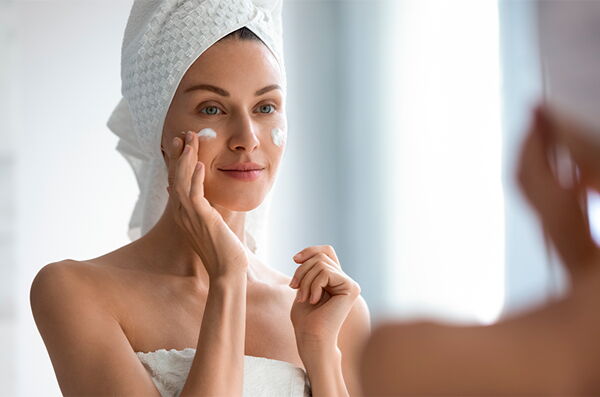During the winter months, the skin tends to become drier and more cracked.
The cold air, the dry heat of the indoor environments, the low humidity levels and the harsh winter wind can in fact dehydrate the epidermis. This can leave the skin much less radiant than normal, not just the face but also the hands, feet and other areas exposed to the elements.
In this article, we're going to look at how to treat skin during the winter months to prevent it from becoming dry.
Symptoms of dry skin
Some of the more common signs and symptoms of dry skin include:
- flaking or flaking;
- redness;
- rough texture;
- itch;
- irritated skin;
- cracks and fissures.
The medical term for dry skin is xerosis. Symptoms can vary in severity and have a different manifestation depending on the affected area of the body.
Specifically, we can examine some of the most frequent consequences of winter cold on certain areas of the body and, above all, we try to better understand how to prevent these manifestations while preserving the health and beauty of the skin.
Moisturize it after washing it
Every time you wash your face, hands or body, you attack the natural barrier of the skin, in particular, its oils. Since these oils help lock in moisture, it is vital to replace and regenerate them as needed. That's why it's important to use a moisturizer every time you wash your skin, especially in the winter.
It can be helpful to keep a good moisturizer near the bath or shower so that you have it on hand immediately after washing.

Use a sunscreen
Given the shorter winter days and less sunlight, it can be tempting to cut sunscreen out of your morning routine, but it's not the right choice. Even in winter, harmful UV rays can put stress on the skin's protective barrier, which is vital for maintaining skin health and hydration. The more hours of sun exposure, even simply for outdoor life, the more attention must be paid to the "protection from UV rays" factor. In particular, if the face remains exposed to the factors of time, and therefore also to UV rays, it is essential to continue to use a cream with adequate sun protection. Not only that: in these cases it is definitely recommended to also integrate vitamin D3.
Use a humidifier
Humidifiers help restore proper humidity in the air, which can be particularly useful when indoor heating indoors is increased in the winter months. Having adequate moisture in the air can help it act as a natural moisturizing agent which, in turn, can prevent and relieve skin dryness.
According to Harvard Health Publishing, a 60% humidifier setting in winter can replenish moisture in the top layer of the skin.

Don't go overboard with exfoliants
Exfoliation, which helps remove dead skin cells from the surface of the skin, can help keep skin smooth and velvety. However, it is possible to over-exfoliate the skin if you use a scrub too often or if you use the wrong products. If the skin appears dry or cracked, mild chemical exfoliants may be considered rather than a physical scrub. Harder scrubs with large particles may be more likely to break down the skin's moisturizing barrier and cause damage.
If the skin is cracked, rough, or irritated, it may be best to avoid exfoliation until the skin has healed.
What to eat
In order to protect ourselves from dry skin in the winter months, it may be useful to use some precautions even at the table.
First of all, drink a lot, at least 3-4 liters of water per day diluted during the day and, preferably, between meals.
We can then take advantage of some precious vitamins such as Vitamin C, which we can integrate if it is impossible to take the correct amount through the foods ingested, specifically, oranges or Kiwis. This vitamin has in fact a very powerful antioxidant effect that we can exploit to protect the skin by breaking down free radicals [8].
Vitamin A and beta carotenes are also a very strong protection for the skin. We can find them in pumpkin as well as in oranges and carrots. We can also integrate them separately, since it is really difficult to take the minimum quantity required through the diet alone. There is scientific evidence that retinol has an effect in slowing the aging processes of the skin or in treating dry or age-affected skin [9]. Further confirmation in the literature is needed but the premises are absolutely promising.
Other supplements that can help are Vitamin D and E. Especially the former should be integrated separately as it is not very present in the diet and the sun exposure is reduced in the winter months [10].

References
[1] https://www.sciencedirect.com/science/article/pii/S2405580819300688
[2] https://www.aad.org/public/everyday-care/skin-care-basics/dry/dermatologists-tips-relieve-dry-skin
[3] https://www.aad.org/public/diseases/az/dry-skin-overview
[4] https://www.bcm.edu/news/hot-showers-can-damage-skin-winter
[5] https://www.ncbi.nlm.nih.gov/pmc/articles/PMC2908954/
[6] https://www.ncbi.nlm.nih.gov/pmc/articles/PMC4885180/
[7] https://www.aad.org/public/everyday-care/sun-protection/sunscreen-patients/sunscreen-faqs
[8] https://pubmed.ncbi.nlm.nih.gov/12569111/
[9] https://www.ncbi.nlm.nih.gov/pmc/articles/PMC2699641/
[10] https://pubmed.ncbi.nlm.nih.gov/11684391/
